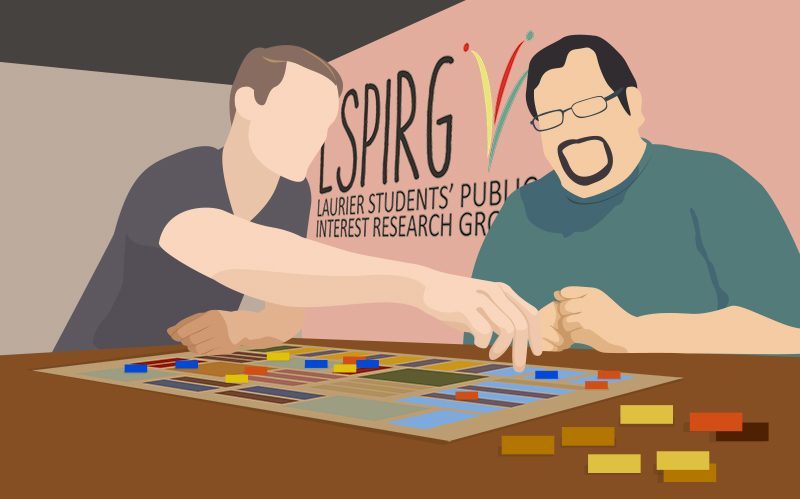BLOC BY BLOCK rocks LSPIRG


Last Wednesday, Laurier Students’ Public Interest Research Group (LSPIRG) hosted K-W Launch of BLOC BY BLOC: The Insurrection Game.
The game was created by Rocket Lee and Tim Simons as a semi-cooperative strategy board game inspired by twenty-first century urban rebellion, according to the Out of Order Games website. Together, the pair have many years of experience in game design, printing, graphic design, web development and running worker cooperatives.
Since its launch in 2015, the game has been promoted through a tour organized by Darius Mirshahi and Sakura Saunders.
“The tour has been going relatively well so far. We’ve done events in about six other places. It’s been a pretty good response everywhere. A lot of board game clubs have come out and have been involved in organizing some of the events. It’s been really cool,” said Mirshahi.
The stop at Wilfrid Laurier University was coordinated by LSPIRG’s volunteer and community engagement coordinator, Hannah Batten.
“I think the interest in hosting the BLOC by BLOC event was just to give people the opportunity to play a board game that kind of talks about and has conversations about colonialism and imperialism and capitalism and have a larger scope of a discussion about a political discourse of different movements that have happened throughout the world,” said Batten.
“I think the nice thing about it is that it gave people the ability to play a game. I think a lot of people like playing games, while also having conversations around those games and the political ethos around them and the philosophies around them and also to meet other people also thinking about the same kinds of struggles, which I think is really significant and building bridges and connections between people in that way.”
The game is currently in board game format, however, individuals are also encouraged to download the game for free from the website and print on their own.
Due to local sourcing of production and supplies from the United States, the cost of production and distribution is higher.
“There is a version that people can download and print online,” said Mirshahi.
“Another cool thing about this board, is that it’s not a copy written type thing. The creators of the board game want it to be accessible and license the game under creative commons, so that anyone can print it out themselves if they don’t feel like they can afford to pay for the cost of production.”
According to Mirshahi, the game is inspired from real world events in recent history like Tahrir Square in Cairo and Gezi Park in Istanbul.
“Some of these movements [sic] over the course of the last decade, where people have been working together to try and bring attention to political corruption and social issues in their countries and have engaged in pretty large demonstrations,” said Mirshahi. “A lot of it is inspired by those events.”
All members of the community were encouraged to attend the event.
“It provides a neat opportunity and a really interesting opportunity for students and people in the community to engage with various types of conversations and different modalities,” Batten said.
“I think often times, our conversations are very academic or sometimes they’re not as accessible to different audiences. It provided a very interesting learning opportunity for people to engage with various topics in a very different context.”

